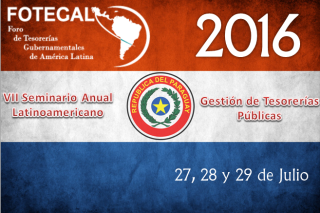Posted by Mario Pessoa[1]
During July 27-29, 2016 the Paraguayan Ministry of Finance organized the seventh Latin American Treasury Forum (FOTEGAL) together with the International Monetary Fund (IMF), the Inter-American Development Bank (IDB), and the World Bank. FOTEGAL aims at providing a permanent regional dialogue for technical discussions and exchange of experiences among national treasurers. The annual seminar has been a key component of the IMF’s technical assistance program and a testimony of significant improvements in treasury management in Latin America.
The Minister of Finance of Paraguay, Mr. Santiago Peña, in his opening remarks emphasized that public finances are related not only to financial stability but also provide a tool to promote growth and development. In a country such as Paraguay with significant development needs, it is important to use public resources wisely. The Minister mentioned that the fiscal rules approved in 2013 had improved the reliability of fiscal policy, and highlighted the country’s efforts to increase public investment to promote development and benefit the population.
Mario Pessoa, Israel Fainboim and Jorge Baldrich from the IMF’s Fiscal Affairs Department presented the preliminary results of a study that documented the policies implemented by state treasuries in the region to cope with errors in fiscal projections. Measures such as the establishment of a ceiling on budget commitments, cash rationing, and an increase in short-term financing have been used elsewhere to mitigate the impact of optimistic revenue projections.
The study – which covers 30 countries in Latin America and the Caribbean – noted the accumulation of expenditure arrears as one of the perverse consequences of poor macroeconomic forecasts. It demonstrated that countries with a Treasury Single Account (TSA) are less prone to errors on their expenditure projections than countries without a TSA, and that countries with medium-term fiscal frameworks perform better both on revenue and expenditure projections. It is expected that the study will be published by the end of 2016.
Other sessions during the seminar discussed active financial investment operations, the use of electronic payment tools to facilitate purchases of goods and services, the accumulation of cash buffers and management of expenditure arrears, and the use of integrated financial management information systems to improve treasury operations. The Inter-American Development Bank updated the result of their survey that measures the main treasury performance indicators. The survey shows that almost all countries in the region show improvement in areas such as the coverage of the TSA, better cash planning, the use of electronic tools for revenue collection and the processing of payments, and financial benefits derived from active cash management.
Thirteen Latin American countries participated in the seminar: Argentina, Chile, Colombia, Costa Rica, Dominican Republic, Ecuador, Guatemala, Honduras, Mexico, Nicaragua, Panama, Paraguay, and Uruguay. The Treasurers presented recent reforms and achievements in their countries, and discussed challenges that lie ahead. They approved a work plan for 2016/2017 that includes new studies, courses, and the use of modern communication technologies to strengthen the exchange of experiences among them. The Costa Rica Treasury will host the next FOTEGAL seminar in 2017.
For more information, go to FOTEGAL Webpage at: http://www.fotegal.org/
[1] Deputy Division Chief, Public Financial Management II Division, Fiscal Affairs Department, IMF.
Note: The posts on the IMF PFM Blog should not be reported as representing the views of the IMF. The views expressed are those of the authors and do not necessarily represent those of the IMF or IMF policy.








